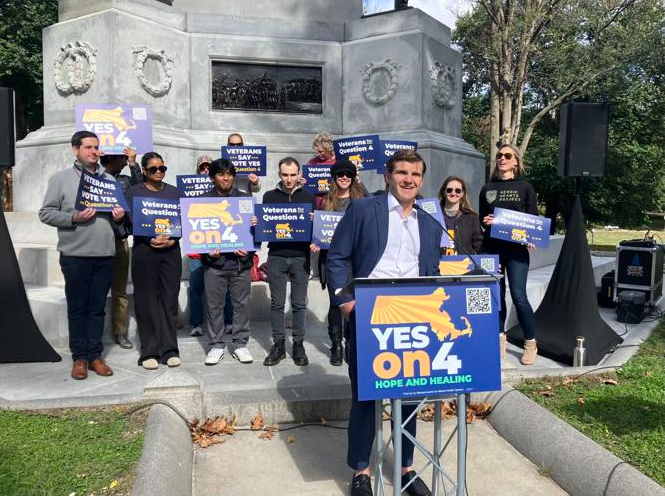Army combat veteran CJ LoConte credits psilocybin, a psychedelic substance found in “magic mushrooms,” for making him a better husband and father.
A doctor first recommended that LoConte, a Duxbury native who said he witnessed multiple soldiers attempt suicide while deployed to the Middle East, try psychedelics when he found himself hospitalized for suicidal ideation. LoConte said he had reached the “lowest point” in his life, after battling mental health issues including having nightmares, drinking, lashing out at others, and feeling numb despite seeking help through the VA.
Psilocybin also saved his life, LoConte said Thursday at the Soldiers and Sailors Monument on Boston Common, where veterans gathered to talk about their support of a ballot question that would decriminalize certain types and small quantities of psychedelic substances. The measure would establish licensed facilities where people could buy and take the drugs under supervision, and Bay Staters would also be permitted to grow and use them at home.
“I do credit my psilocybin experience with saving my life because seven days after my first experience, another former soldier of mine died by suicide, and that still hits hard,” LoConte, who was an Army officer, said. “That still hurts and it pisses me off, but that’s why doing this work is important. That’s why passing Question 4 is important.”
Veterans touted psychedelics as a critical mental health treatment option, particularly when other medications and therapies are ineffective. Elected officials gathered last week to discuss those same benefits, as they too sought to drum up support for Question 4 that would legalize psilocybin and psilocin found in mushrooms, and dimethyltryptamine, mescaline and ibogaine found in plants.
Jamie Morey of Marshfield said her husband, an Iraq combat veteran, suffers from debilitating PTSD and treatment-resistant depression.
Morey said she was inspired to advocate for psychedelic-assisted therapy after attending a trauma retreat outside of the United States, where she witnessed women veterans and spouses experience “profound” healing. Morey said her husband and others in Massachusetts should have the “legal right to access this care” without needing to travel overseas or “break the law to access an unregulated underground” market.
“I beg of my fellow citizens, before you vote on Question 4, please know that you hold real people’s lives in your hands, the lives of veterans, first responders and average citizens who have run out of options and are running out of hope,” Morey, founder of advocacy group Parents for Plant Medicine, said. “Please educate yourself by reading up on the clinical research, which proves the safety and efficacy of this treatment, and listen to the countless stories of healing from those who have benefitted from psychedelic-assisted therapy.”
Unlike the cannabis industry, the ballot question does not call for retail sales of psychedelics. Bay Staters ages 21 and older would be permitted to grow, possess and use the substance. They could grow the substances in a 12-foot by 12-foot area at home, consume them without supervision, and give away small amounts to friends and family members ages 21 and older.
Poll results released this week from The Boston Globe and Suffolk University found likely voters are nearly evenly split over the question, with 46.8 percent of respondents in favor and 46 percent opposed.
Thursday’s event coincided with World Mental Health Day, noted U.S. Navy veteran Emily Oneschuk, the grassroots campaign director for Massachusetts for Mental Health Options. Oneschuck said 22 veterans die by suicide each day nationwide, and she said the campaign focused on veterans because they “have really led the charge in many ways with this advocacy.”
Oneschuk became an advocate after attending a psychedelic retreat in Jamaica, which she said helped her overcome the PTSD, anxiety and the depression that “destroyed the life and energy” she once had.
“Psychedelics were the first crack in the dam that let the healing flood in for me,” Oneschuk said. She added, “This won’t fix our whole system, but it will help people, and it’s an important piece and a complex solution to a very big problem.”
Oneschuk, asked about safety concerns over the home grow option, said people are already using psychedelics in Massachusetts.
“Keeping them under prohibition just prevents people from having open and honest conversations about it with their health care providers,” she said.
The Boston Globe’s Editorial Board, which spoke with LoConte about his experience using psychedelics, urged Bay Staters Thursday to vote no on the question, saying it “goes too far” when it comes to the home cultivation element.
“If Question 4 on November’s ballot just allowed patients like LoConte to receive the drugs in safe settings, it might be easier to support,” the Editorial Board wrote. “But the proposal goes further than that, also allowing home growing and unregulated consumption of five psychedelic drugs, some of which carry real health risks.”
The editorial board added, “That’s the basic contradiction of Question 4 — which on one hand stresses the importance of rigorous oversight and on the other proposes a free-for-all.”

